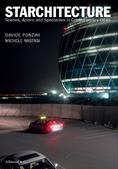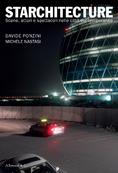tools and techniques urban projects premio letteratura urbanistica collaborative urban design paesaggio innovation inclusive processes creativity periodic news welfare giornata di studi inu social housing landscapes open position participation Community strategic planning large scale plans & projects economics città storica urban design social practices special news composition social capital
Starchitecture
Scenes, Actors and Spectacles in Contemporary Cities
Davide Ponzini, Michele Nastasi
Internationally renowned architects are at centre stage in public debates, not only with reference to designing aesthetically striking artefacts, but also to urban regeneration programmes and urban branding. The narrative of the "Bilbao effect" has been spreading worldwide, apparently leading cities to compete in collecting spectacular projects and buildings, sometimes with little regard for their urban context, size and functions in the global market. Despite the fact that these forms of urban development have been changing the landscape in several cities, attention and explanations regarding the rationalities implied in such decision making and localization processes are today limited and sometimes misleading.
The authors offer a critical reappraisal of oversimplified interpretations of star architecture and its many urban implications. Drawing on the study of relevant architectural decision-making processes in Bilbao, Abu Dhabi, Paris, New York City and the Vitra Campus and on an original photographic corpus, the book argues that these phenomena have high territorial variety, depending on local as well as more contingent factors.
It explains that architectural and urban spectacles are often used by urban policymakers in order to drive political consensus, maximize media exposure and eventually cover economic and real-estate interests, potentially inducing perverse or even paradoxical effects.
The role and autonomy of architects and planners are evidently weaker in these postmodern urban conditions; nonetheless this book pragmatically outlines critical perspectives for interpreting architectural and urban projects as meaningful elements of contemporary urban landscapes.
CONTENTS
SCENES, ACTORS AND SPECTACLES IN CONTEMPORARY CITIES
Acknowledgements
STARCHITECTURE IN CONTEMPORARY CITIES
• Global Architecture Firms: Creative and Reliable Strategies
THE COMMONPLACE OF BILBAO
• The Dominant Narrative of the Museum That Landed in Bilbao and Its Critics
• Regeneration in Bilbao 1990-2010: An Actual Urban Process
• McGuggenheim:
Global Museums and Franchise Urban Development Projects?
• Bilbao Effects and Narrative Defects
ABU DHABI:
COLLECTING SPECTACULAR ARCHITECTURE IN AN URBAN AND DEMOCRATIC VACUUM
• Programming the Urban Growth Machine
• Urban Structure and Planning Processes in Abu Dhabi
• Precincts, Key Actors and Large-Scale Development Projects
• Large-Scale Project on a Global Stage:
Saadiyat Island and the Cultural District
• Urban Development Projects and Star Architecture in a Democratic Vacuum
GRANDS TRAVAUX AND GRANDS TABLEAUX:
URBAN TRANSFORMATIONS AND SPECTACLES IN CONTEMPORARY PARIS
• The President’s Grands Travaux in Paris
• Two Non-Profit Representations
• Urban Visions and the President’s Visibility:
Archistars and Urbanistars of Le Grand Paris
• The Parisian Elite between Symbolic Policy and Urban Transformations
NEW YORK CITY’S PLURAL ARCHITECTURAL PROFILES
• Growing by Project and Piecemeal Market Innovations
• Ground Zero / Year Zero
• Corporate Architectural Representations
• Markitecture and Extra-Luxury Condos
• Architecture for Non-Profit Museums:
Between Identity and Fundraising
• New York City Publics
• Global Architecture in a Moderately Plural City
THE VITRA CAMPUS IS NOT A CITY
• Architectural Collecting on the Vitra Campus
• Immaterial Entrepreneurship and Architectural Distinction
• The Vitra Campus Is Neither an Architectural Collection Nor a City
STARCHITECTURE: ANY PLANS FOR THE FUTURE?
• Multiple Territories and Scenes of Star Architecture
• Symbolic Logic and Urban Development Paradoxes
• Urban Visions, Iconic Spectacles and Political Consensus
• Archistars in Postmodern Urban Conditions
• From Architectural Spectacles to Urban Landscapes
ABOUT THE AUTHORS:
Davide Ponzini received his PhD in Urban Planning from the Politecnico di Milano, where he is currently Assistant Professor of Urban Planning. His research interests are planning theory and urban policy tools, urban and cultural policy. He has been a visiting scholar at Yale University, Johns Hopkins University, Columbia University and Sciences Po Paris. His research work has been published in the main scientific journals in the planning and architectural field ("Urban Studies", "Cities", "Environment and Planning C", "European Planning Studies" and others) and has been presented in international congresses, lectures and seminars. Author of the book Il territorio dei beni culturali (Carocci, Rome 2008) and co-author, with Pier Carlo Palermo, of the book Spatial Planning and Urban Development: Critical Perspectives (Springer, Heidelberg and New York 2010).
Michele Nastasi received his Master of Science in Industrial Design at the Politecnico di Milano, where he teaches Architectural Photography. Since 2004 he has been working as a photographer of architecture, urban landscape and interiors for international architectural firms and magazines, as well as developing his own research projects. His pictures have been published in journals and magazines ("Lotus", "A + U", "Abitare" and others), books (recently, Counterpoint: Daniel Libeskind in Conversation with Paul Goldberger, Monacelli Press, New York/Birkhäuser, Basel 2008, and Daniel Libeskind and the Contemporary Jewish Museum, Rizzoli International, New York 2008) and exhibited at the Biennale di Venezia and in other personal and collective exhibitions in Europe and the USA. Since 2007 he has been Managing Editor of Lotus international.
Online resources and links




Planum
The Journal of Urbanism
ISSN 1723-0993
owned by
Istituto Nazionale di Urbanistica
published by
Planum Association
ISSN 1723-0993 | Registered at Court of Rome 4/12/2001, num. 514/2001
Web site realized by ChannelWeb & Planum Association | Powered by BEdita 3








